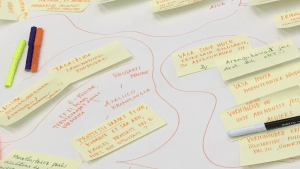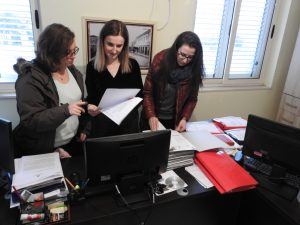Lessons from Reformers: Albania Publishes Local Government Legislation Online
This case study is part of the Regulatory Governance in the Open Government Partnership publication.
 Regulatory Governance in the Open Government Partnership When citizens understand and help to shape the rules that govern society, regulations are more effective, business environments are stronger, and levels of corruption are lower. This paper looks at…
Regulatory Governance in the Open Government Partnership When citizens understand and help to shape the rules that govern society, regulations are more effective, business environments are stronger, and levels of corruption are lower. This paper looks at… Emiriola Velia had a difficult time getting the answers she needed. As the representative of a regional youthRecognizing that investing in youth means investing in a better future, OGP participating governments are creating meaningful opportunities for youth to participate in government processes. Technical ... More council in Kukës in northeastern Albania, Velia relied on understanding the actions taken by her local government to organize and engage effectively in the political process. However, municipal council decisions were not easily accessible. She had to request the information directly from the government, which meant it often took three to four weeks before she received the information she needed. Today, this process looks a lot different. A civil-society driven reform has led to all 61 of Albania’s municipalities publishing municipal council decisions online on a central platform.
Background
Velia’s experience was not an isolated example. Albania’s system for publishing government legislation was fragmented and inefficient. Though legally required, few local governments provided access to legislationCreating and passing legislation is one of the most effective ways of ensuring open government reforms have long-lasting effects on government practices. Technical specifications: Act of creating or r... – including municipal council decisions. Many even lacked official websites through which to share information with citizens. In 2016, only 12 of the 61 municipalities published local legislation. This lack of information was a serious problem, especially given new decentralization reforms that endowed local governments with a greater range of responsibilities.
The Center for Public Information Issues (INFOCIP), an Albanian NGO that promotes transparency and the rule of law, had been advocating for the online publication of local decisions since 2009. INFOCIP maintained a platform – vendime.al – that included information from an increasing number of municipalities. The organization partnered with the Ministry of State for Local Issues and pushed for further publication of decisions in the framework of the decentralization reforms.
Albanian municipalities publish legislation online on a single platform for the first time
At the urging of INFOCIP, the Albanian government committed to publishing central and local government legislation online on vendime.al as part of its 2016–2018 OGP action plan. Several donors (including the National Endowment for Democracy, the US embassy, and UNDP’s STAR project) supported municipal efforts to disclose legislation. Many municipalities received financial support from INFOCIP itself.
Implementation was swift. According to INFOCIP’s monitoring reports, although only 20 percent of municipalities disclosed local legislation in 2016, this rate increased to 67% by 2017. Most important, by 2018, all 61 Albanian municipalities published local legislation on vendime.al. At this point, the platform hosted more than 20,000 municipal council decisions.
Data usage grew alongside the increase in information available. Users viewed 1.5 million pages on the site in 2018, compared to about 240,000 when the site first launched in 2013. Altogether, more than 140,000 unique users (equivalent to 5 percent of Albania’s population) visited the site and recorded almost ten million hits.
Lessons learned from the Albanian experience
- Find where institutional priorities align. The Albanian commitmentOGP commitments are promises for reform co-created by governments and civil society and submitted as part of an action plan. Commitments typically include a description of the problem, concrete action... was successful in large part because various stakeholders – including civil society, local government actors, and international donors – worked together. Finding where priorities and work plans intersect is critical for this kind of ambitious countrywide reform.
- Engage civil society during both design and implementation. INFOCIP was able to propose integrating the initiative into the OGP action plan because of a collaborative action planAction plans are at the core of a government’s participation in OGP. They are the product of a co-creation process in which government and civil society jointly develop commitments to open governmen... design process in which civil society could suggest reforms. More important, however, INFOCIP – as the lead implementer – was critical to the success of the initiative. This highlights the key role that civil society can play in the implementation of regulatory and legal transparencyAccording to OGP’s Articles of Governance, transparency occurs when “government-held information (including on activities and decisions) is open, comprehensive, timely, freely available to the pub... More reforms.
- Government involvement is necessary for long-term sustainability. At the moment, INFOCIP uses its own resources to provide a help desk function that assists local governments in publishing their information. This function is particularly needed after electionsImproving transparency in elections and maintaining the independence of electoral commissions is vital for promoting trust in the electoral system, preventing electoral fraud, and upholding the democr... More when there is staff turnover. Ultimately, however, it is the government that has a duty to devote state resources to ensure free and permanent access to laws and regulations that are updated, complete, and properly reviewed.
Access to government legislation is an essential component of good governance. When citizens are better informed, they are empowered to use that information to shape policies, services, and budgets. In Albania, Emiriola Velia can now access all of her local government’s acts online. She no longer has to file information requests to get the information she needs. This saves her time and helps her regional youth council monitor their municipality’s decisions in real time. As more countries like Albania undertake similar reforms to publish legislation, ensuring that results permeate across all levels of government will be critical.
This story was made possible through an interview with Gerti Shella (Executive Director, INFOCIP).
Featured Photo Credit: vendime.al
No comments yet
Related Content

Regulatory Governance in the Open Government Partnership
When citizens understand and help to shape the rules that govern society, regulations are more effective, business environments are stronger, and levels of corruption are lower. This paper looks at…

Lessons from Reformers: Estonia Shifts from Online Consultation to Co-Creation
Learn how Estonia is opening up their regulatory processes to citizens through open government reforms.

Lessons from Reformers: Mexico Builds a Regulatory Ecosystem
Explore Mexico’s journey to building one of the most transparent regulatory systems in the world, and see how they’re leveraging the regulatory system during COVID-19.


Leave a Reply